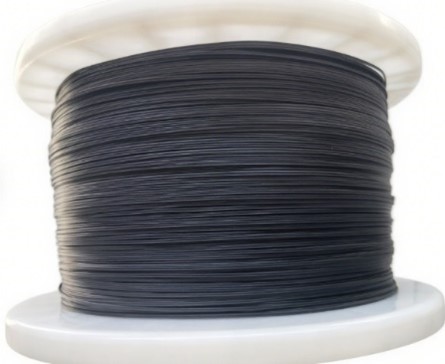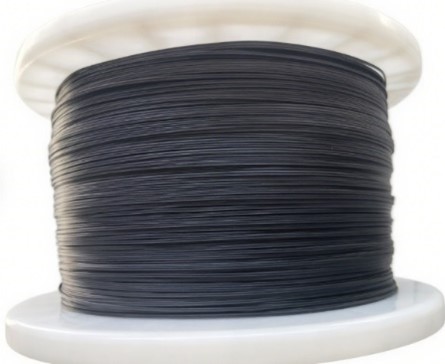High-temperature electrical systems demand components that deliver reliable performance under extreme conditions. One critical component in such applications is the etched silver plated nickel PTFE wire. Combining exceptional conductivity, temperature resilience, and environmental adaptability, this wire is widely used in industries such as aerospace, automotive, and electronics manufacturing.
Why Choose Etched Silver Plated Nickel PTFE Wire?
PTFE (Polytetrafluoroethylene) insulated wires are known for their chemical resistance and thermal stability. However, the smooth surface of standard PTFE insulation can limit bonding with coatings or resins, creating challenges in certain manufacturing processes. This is where etched silver plated nickel PTFE wire (also known as etched silver coated nickel PTFE wire) stands out.
The etching process introduces microscopic textures and tiny pores on the PTFE insulation surface, significantly enhancing its adhesion properties. This means that when bonding PTFE wire to epoxy powders or resins, the adhesion strength improves dramatically, ensuring better durability and reliability in finished products. Under a 5000x microscope, these microscopic features can be observed clearly, demonstrating the wire’s superior bonding characteristics.
Key Features of Etched Silver Plated Nickel PTFE Wire
Excellent Conductivity
Silver-plated nickel conductors provide outstanding electrical conductivity. This ensures minimal energy loss and consistent signal transmission, making it ideal for high-frequency and high-current applications.
High-Temperature Resistance
This wire can operate continuously at temperatures up to 260℃ and withstand short-term exposure to 300℃. Its PTFE insulation ensures that performance remains stable even in extreme heat, reducing the risk of failure in high-temperature environments.
Environmental Adaptability
PTFE insulation offers excellent resistance to oils, acids, and other harsh chemicals, making etched silver plated nickel PTFE wire suitable for challenging industrial environments. It maintains mechanical integrity and electrical performance, even under prolonged exposure to aggressive substances.
Enhanced Bonding Capability
The etched surface significantly improves adhesion with coatings, resins, or epoxy powders. This makes assembly processes more reliable, reduces manufacturing defects, and enhances the lifespan of the final product.
Applications of Etched Silver Plated Nickel PTFE Wire
Thanks to its unique combination of conductivity, thermal resistance, and chemical durability, etched silver plated nickel PTFE wire finds applications across a wide range of industries:
- Aerospace: Wiring for high-temperature avionics systems.
- Automotive: Components in electric vehicles and high-performance engines.
- Electronics Manufacturing: High-frequency signal lines, precision devices, and sensors.
- Industrial Equipment: Machinery requiring reliable wiring in harsh chemical or thermal environments.
Its flexibility, thermal endurance, and reliable conductivity make it an essential component in systems where performance cannot be compromised.
Horle Etched Silver Coated Nickel PTFE Wire
Horle Etched Silver Coated Nickel PTFE Wire
Horle offers high-quality etched silver plated nickel PTFE wire designed for demanding electrical applications. Below are the technical specifications and characteristics:
Technical Parameters
- Conductor: Silver Plated Nickel
- Conductor Size: ≥0.25mm
- Silver Coating Thickness: ≥2μm
- Jacket: 260℃ PTFE
- Color Options: Clear, Red, Green, Black, Yellow, Purple, Brown, and more
- Compliance: RoHS & REACH
Etched Silver Coated Nickel PTFE Wire Characteristics
Bonding Property: Etching the PTFE surface creates microscopic pores, enhancing adhesion with epoxy powders or resins. Standard PTFE wire lacks this feature, resulting in poor bonding strength.
Temperature Resistance: Continuous operation up to 260℃; short-term exposure up to 300℃.
Environmental Adaptability: Resistant to oil, acid, and other harsh conditions, ensuring durability in challenging environments.
This combination of features ensures that Horle’s etched silver plated nickel PTFE wire meets the rigorous demands of high-temperature and high-performance electrical systems.
Tips for Selecting and Using Etched Silver Plated Nickel PTFE Wire
When working with etched silver coated nickel PTFE wire, it’s important to consider several factors to ensure optimal performance:
- Conductor Size: Choose a conductor size appropriate for the current load and signal requirements.
- Silver Coating Thickness: A coating thickness of at least 2μm ensures excellent conductivity and durability.
- Temperature Rating: Verify that the wire’s PTFE insulation can handle the maximum operating temperature in your application.
- Environmental Conditions: Consider exposure to chemicals, oils, or acids to select the most suitable wire type.
- Bonding Requirements: If your process involves bonding PTFE to epoxy or resin, ensure you use etched PTFE wire to achieve strong adhesion.
By carefully evaluating these factors, engineers and technicians can maximize reliability and lifespan in high-temperature or chemically aggressive environments.
Conclusion
For industries requiring dependable, high-temperature electrical wiring, etched silver plated nickel PTFE wire offers unmatched performance. Its superior conductivity, excellent thermal stability, and enhanced bonding properties make it indispensable for critical applications in aerospace, automotive, electronics, and industrial machinery.
Horle’s etched silver coated nickel PTFE wire combines cutting-edge manufacturing with rigorous quality standards, ensuring professionals receive a product that performs reliably in extreme conditions. Investing in Horle’s wire solutions means enhancing system reliability, reducing maintenance costs, and achieving superior performance in high-temperature electrical systems.








